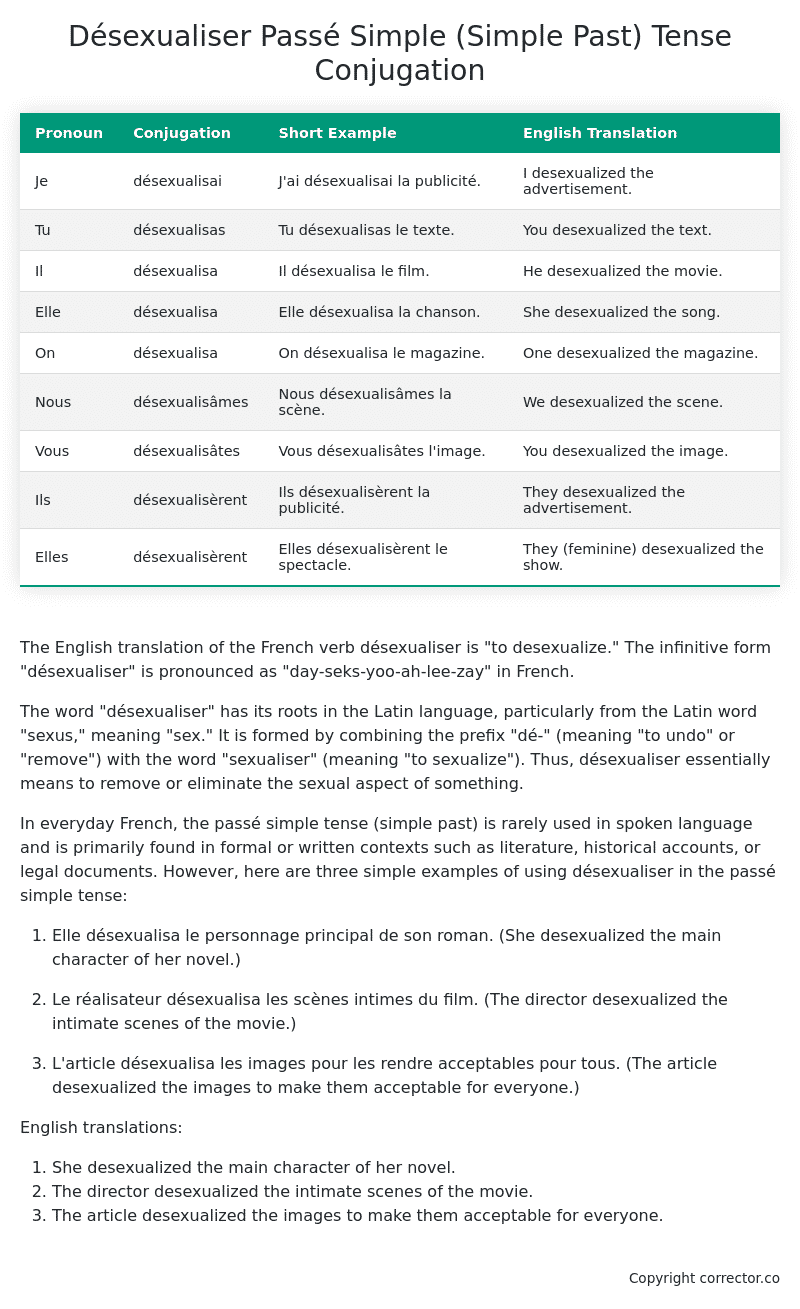Passé Simple (Simple Past) Tense Conjugation of the French Verb désexualiser
Introduction to the verb désexualiser
The English translation of the French verb désexualiser is “to desexualize.” The infinitive form “désexualiser” is pronounced as “day-seks-yoo-ah-lee-zay” in French.
The word “désexualiser” has its roots in the Latin language, particularly from the Latin word “sexus,” meaning “sex.” It is formed by combining the prefix “dé-” (meaning “to undo” or “remove”) with the word “sexualiser” (meaning “to sexualize”). Thus, désexualiser essentially means to remove or eliminate the sexual aspect of something.
In everyday French, the passé simple tense (simple past) is rarely used in spoken language and is primarily found in formal or written contexts such as literature, historical accounts, or legal documents. However, here are three simple examples of using désexualiser in the passé simple tense:
-
Elle désexualisa le personnage principal de son roman.
(She desexualized the main character of her novel.) -
Le réalisateur désexualisa les scènes intimes du film.
(The director desexualized the intimate scenes of the movie.) -
L’article désexualisa les images pour les rendre acceptables pour tous.
(The article desexualized the images to make them acceptable for everyone.)
English translations:
- She desexualized the main character of her novel.
- The director desexualized the intimate scenes of the movie.
- The article desexualized the images to make them acceptable for everyone.
Table of the Passé Simple (Simple Past) Tense Conjugation of désexualiser
| Pronoun | Conjugation | Short Example | English Translation |
|---|---|---|---|
| Je | désexualisai | J’ai désexualisai la publicité. | I desexualized the advertisement. |
| Tu | désexualisas | Tu désexualisas le texte. | You desexualized the text. |
| Il | désexualisa | Il désexualisa le film. | He desexualized the movie. |
| Elle | désexualisa | Elle désexualisa la chanson. | She desexualized the song. |
| On | désexualisa | On désexualisa le magazine. | One desexualized the magazine. |
| Nous | désexualisâmes | Nous désexualisâmes la scène. | We desexualized the scene. |
| Vous | désexualisâtes | Vous désexualisâtes l’image. | You desexualized the image. |
| Ils | désexualisèrent | Ils désexualisèrent la publicité. | They desexualized the advertisement. |
| Elles | désexualisèrent | Elles désexualisèrent le spectacle. | They (feminine) desexualized the show. |
Other Conjugations for Désexualiser.
Le Present (Present Tense) Conjugation of the French Verb désexualiser
Imparfait (Imperfect) Tense Conjugation of the French Verb désexualiser
Passé Simple (Simple Past) Tense Conjugation of the French Verb désexualiser (You’re reading it right now!)
Passé Composé (Present Perfect) Tense Conjugation of the French Verb désexualiser
Futur Simple (Simple Future) Tense Conjugation of the French Verb désexualiser
Futur Proche (Near Future) Tense Conjugation of the French Verb désexualiser
Plus-que-parfait (Pluperfect) Tense Conjugation of the French Verb désexualiser
Passé Antérieur (Past Anterior) Tense Conjugation of the French Verb désexualiser
Futur Antérieur (Future Anterior) Tense Conjugation of the French Verb désexualiser
Subjonctif Présent (Subjunctive Present) Tense Conjugation of the French Verb désexualiser
Subjonctif Passé (Subjunctive Past) Tense Conjugation of the French Verb désexualiser
Subjonctif Imparfait (Subjunctive Imperfect) Tense Conjugation of the French Verb désexualiser
Conditionnel Présent (Conditional Present) Tense Conjugation of the French Verb désexualiser
Conditionnel Passé (Conditional Past) Tense Conjugation of the French Verb désexualiser
Conditionnel Passé II (Conditional Past II) Tense Conjugation of the French Verb désexualiser
L’impératif Présent (Imperative Present) Tense Conjugation of the French Verb désexualiser
L’impératif Passé (Imperative Past) Tense Conjugation of the French Verb désexualiser
L’infinitif Présent (Infinitive Present) Tense Conjugation of the French Verb désexualiser
L’infinitif Passé (Infinitive Past) Tense Conjugation of the French Verb désexualiser
Le Participe Présent (Present Participle) Tense Conjugation of the French Verb désexualiser
Le Participe Passé (Past Participle) Tense Conjugation of the French Verb désexualiser
Struggling with French verbs or the language in general? Why not use our free French Grammar Checker – no registration required!
Get a FREE Download Study Sheet of this Conjugation 🔥
Simply right click the image below, click “save image” and get your free reference for the désexualiser Passé Simple tense conjugation!

Désexualiser – About the French Passé Simple (Simple Past) Tense
Formation
Usage
Narration
Historical Context
Interactions with other tenses
Passé Composé
Imparfait
Conditional and Subjunctive
Summary
I hope you enjoyed this article on the verb désexualiser. Still in a learning mood? Check out another TOTALLY random French verb conjugation!


